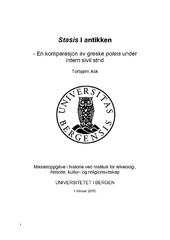Stasis i antikken. En komparasjon av greske poleis under intern sivil strid
Master thesis
Permanent lenke
https://hdl.handle.net/1956/11762Utgivelsesdato
2016-02-01Metadata
Vis full innførselSammendrag
Sammendrag Denne avhandingen tar for seg stasis i antikke polis, med fokus på Athen, Korkyra og Sparta. Jeg har forsøk å finne svar på hva som får stasis til å bryte ut, og hvem som kjemper med hverandre. Jeg har også tatt for meg Paul Cartledges utsagn om normalisering i Sparta. I introduksjonen vil jeg ta for meg hvilke kilder jeg har brukt og hvorfor. I kapittel 2 del vil jeg se på hva forskerne har kommet frem til med stasis og hvordan de behandler dette tema. Grunnet plass har jeg tatt for meg G.E.M de Ste. Croix, Andrew Lintott, Josiah Ober og Nick Fisher. Kapittel 3 en case study av de tre polis hvor seg vil se på eksempler av stasis. I kapittel 4 vil komparasjonen komme, hvor jeg sammenligner de tre polis for å finne likheter og forskjeller. Det man finner med disse eksemplene er at det er flere komplekse grunner til at stasis bryter ut. Maktkamp, kamp om rettighter og ulikhet blant klassene er noen eksempel, men også økonomi og ære spiller en rolle. Når det gjelder Sparta konkluderer jeg med at selv om det oppstår stasis her, som var et vanlig fenomen ellers, er det noe distinkt spartansk med den og er dermed ulikt og ikke en typisk normalisering. Abstract This thesis is a study into stasis (civil unrest) in three of the ancient Greek City- states. It centres on Athens, Corcyra and Sparta, where I have sought to find some explanations as to who in the polis is fighting whom, and what were some central reasons for the outbreak of political violence here. I will also, based on Paul Cartledge's assumption that there is a normalization in the Spartan polis from the fifth to the third century, see if this really is the case or if Sparta remains destictly Spartan? In the introduction I will be showing what literal sources I will be using to look into this distant past and also present a list of definitions for terminology. In chapter 2 will introduce some of the modern major scientific contributors to the question of stasis in the ancient world and highlight some of their view points on the subject. I have, due to a limited amount of time and space, chosen to concentrate on G.E.M de Ste. Croix, Andrew Lintott, Josiah Ober and Nick Fisher. In chapter 3 I will go into detail in a case study of the different poleis and explain the details of the subsequent stasis that they experience. Here I will also bring in the view point of the aforementioned scientists to see if we find some great examples of their view in the material. Chapter 4 will be a comparison of the three polis where I will present what where the main reasons, methods of the stasis? Who was leading in the different cases and what ended up being the solution to the civil unrest? What we find in the case of these stasis is the there were several contributing factors that played in, like a power struggle, clamour for reform due to lack of privileges among the classes. Economy played its part, like it often does. Also honour and the pursuit of it, and hybris among the elite. There is also difficult to see clear one clear bond of solidarity in all the cases because of the fact that the classes fought with different peoples in the various examples. As to Sparta, I conclude that Sparta, even though she does experience a common fenomenon in the third century, there is still something very Spartan over the stasis that makes is so that I would say its is not really so much a normalization as it is the Spartan kings trying to return Sparta to something quite different from the other examples.
